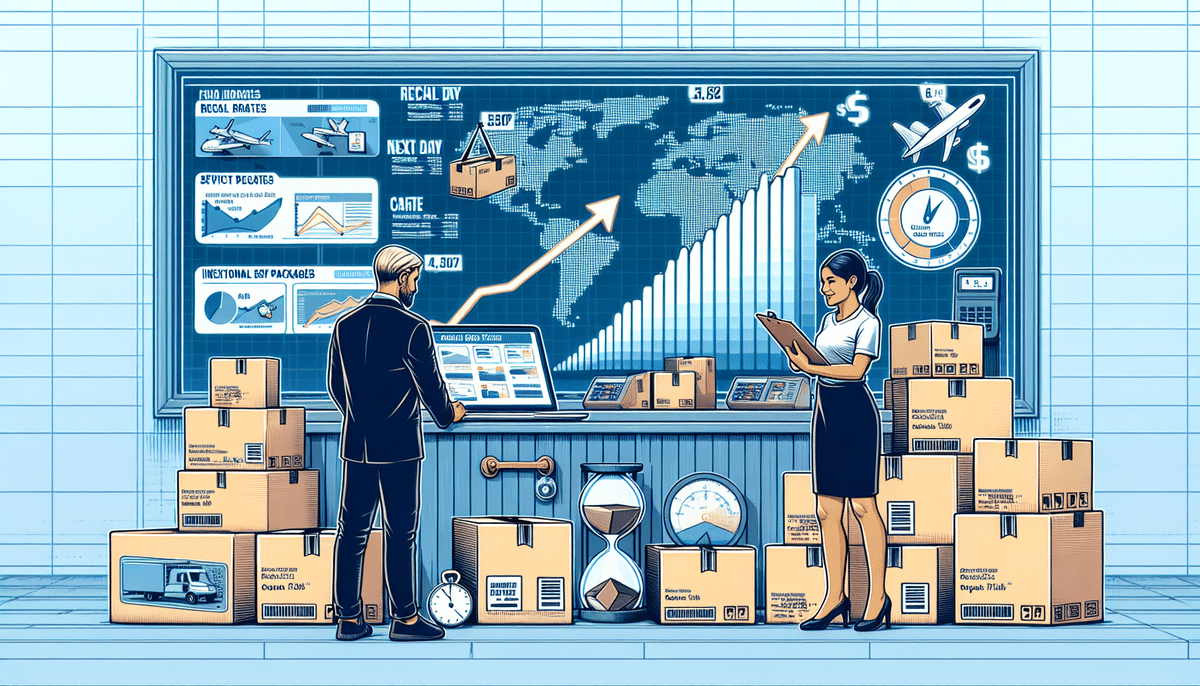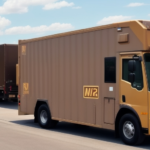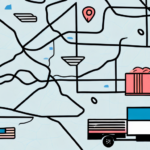Retail Rates Applied to This Shipment: Understanding UPS Shipping Label Rates
UPS is one of the most widely recognized shipping companies globally, handling over 20 million packages daily (UPS Sustainability Report). As with any delivery service, understanding the rates and fees associated with sending your package is essential. In this comprehensive guide, we'll focus on retail rates and how they apply to shipping labels, providing you with the insights needed to optimize your shipping strategy.
What are Retail Rates and Why Are They Important for Shipping Labels?
Retail Rates refer to the standard charges applied by UPS when sending a package without a pre-negotiated contract. These rates are typically used by individuals and small businesses with low shipping volumes and are billed per package. According to UPS, retail rates are generally higher than negotiated contract rates, making it crucial for frequent shippers to understand these differences to manage costs effectively.
Retail rates can vary based on several factors, including the weight, size, and destination of the package. For instance, shipping a package internationally usually costs more than domestic shipping due to additional handling and customs procedures. Additionally, UPS offers various service levels under retail rates, such as UPS Ground Shipping or expedited options like UPS Express Shipping, each affecting the overall cost.
Understanding retail rates empowers individuals and small businesses to make informed decisions about their shipping options. By comparing retail rates to negotiated contract rates, businesses can assess whether it's more cost-effective to negotiate a contract with UPS or continue using retail rates. Additionally, considering any additional fees, such as fuel surcharges or residential delivery fees, is essential when calculating the total cost of shipping.
How are UPS Shipping Label Rates Calculated?
UPS shipping label rates are determined by a combination of factors, including the shipment’s weight, dimensions, destination and origin, and the selected UPS service level. UPS utilizes a mix of real-time data and historical trends to calculate these rates, ensuring accurate pricing tailored to various shipping scenarios.
Moreover, UPS offers discounts for customers who ship in large volumes or utilize specific services, such as UPS Worldwide Express Freight. These discounts can significantly reduce shipping label rates, helping businesses minimize their shipping expenses. To assist customers in understanding and optimizing their shipping costs, UPS provides resources like the UPS Rate and Service Guide, which offers detailed cost structures for various shipping needs.
The Difference Between Retail Rates and Contract Rates
Contract Rates are discounted rates negotiated between UPS and businesses or individuals who consistently send high volumes of packages. These rates are typically lower than retail rates due to volume discount agreements. While contract rates are exclusive to those who have secured such agreements, retail rates are available to anyone using the UPS shipping service.
In addition to lower rates, contract agreements may include benefits like dedicated account management and customized shipping solutions, which can streamline shipping processes and further reduce costs for businesses. However, for individuals or businesses that do not ship frequently enough to qualify for contract rates, retail rates remain the most cost-effective option.
Understanding the Different Types of UPS Shipping Label Rates
UPS offers three primary types of shipping label rates: Retail Rates, Daily Rates, and Surcharges.
- Retail Rates: Charged to customers without negotiated rates.
- Daily Rates: Applied to customers with negotiated contract rates.
- Surcharges: Additional fees for special shipping requirements, such as delivery outside regular hours or handling hazardous materials.
Additionally, UPS provides special rates tailored to specific industries like healthcare, automotive, and retail, offering significant cost savings by addressing the unique needs of these sectors.
Beyond rate types, UPS offers various shipping options, including Ground, Air, and International Shipping. Each option comes with its own set of rates and delivery times, allowing customers to choose the best fit for their needs and budget.
Factors that Affect UPS Shipping Label Rates
Several factors influence UPS shipping rates, including:
- Package Weight and Dimensions: Heavier and larger parcels incur higher shipping costs.
- Destination and Origin: Longer distances and international shipments generally cost more.
- Service Level: Faster delivery options, such as expedited services, increase the rate.
- Item Type: Shipping fragile, hazardous, or items requiring special handling can add to the cost.
- Seasonal Demand: Peak times, like holidays, may see increased rates due to higher demand.
Properly labeling and packaging items, especially those with special handling requirements, can help avoid additional fees and ensure timely delivery.
Moreover, the time of year plays a role, as shipping rates may rise during peak seasons. Planning ahead and exploring various shipping options early can help mitigate unexpected costs.
How to Get the Best Retail Rates for Your Shipment
Maximizing your retail rates involves several strategies:
- Consolidate Shipments: Combining multiple packages into a single shipment or opting for ground delivery can lower costs.
- Bulk Shipping: Sending packages in bulk can qualify you for higher volume discounts.
- Negotiate with Carriers: Many carriers, including UPS, offer discounts to frequent or high-volume shippers. Negotiating based on shipment type, destination, and delivery time can yield better rates.
- Use Shipping Software: Implementing shipping software solutions can provide discounted rates, facilitate rate comparisons across different carriers, and optimize your shipping strategy using data and analytics.
By leveraging these strategies, you can effectively reduce your shipping costs while maintaining efficient delivery operations.
Tips for Reducing Your UPS Shipping Label Rates
Implementing the following tips can help reduce your UPS shipping label rates:
- Optimize Packaging: Use the smallest possible box or envelope suitable for your item to reduce weight and size, thus lowering shipping charges.
- Negotiate Rates: Engage with UPS to negotiate lower prices, especially if you are a frequent shipper or handle large volumes.
- Utilize Shipping Aggregators: Aggregators can offer competitive shipping rates by consolidating shipments from multiple customers.
- Take Advantage of Discounts and Promotions: UPS provides various discounts for businesses that ship regularly or in bulk. Additionally, using UPS's online shipping tools can grant access to discounted rates for specific services.
- Choose Ground Shipping: Opting for ground shipping instead of air or expedited services can significantly reduce costs.
Common Mistakes to Avoid When Using Retail Rates for Your Shipment
Avoiding the following common mistakes can help you make the most of UPS retail rates:
- Incorrect Packaging: Using the wrong shipping box or improper packaging can lead to additional fees and potential damage to your items.
- Inaccurate Measurements: Not accurately measuring the package's weight and dimensions can result in unexpected charges.
- Undeclared Package Value: Failing to declare the correct value of the package can limit UPS's reimbursement in case of loss or damage.
- Improper Service Selection: Choosing a faster shipping service than necessary can unnecessarily increase your shipping costs.
By carefully planning and executing your shipments, you can avoid these costly mistakes and ensure a smooth shipping experience.
How to Read Your UPS Shipping Label Rate Quote
Understanding your UPS shipping label rate quote is essential for managing shipping costs effectively. A typical rate quote includes:
- Service Level: The selected UPS service, such as UPS Ground or UPS Next Day Air.
- Package Details: Information about the package's weight and dimensions.
- Pickup and Delivery Locations: The origin and destination addresses.
- Total Cost: The overall cost for the shipment, including any additional fees.
Additional fees, such as fuel surcharges or residential delivery fees, may also be included based on the shipment's specifics. It's crucial to review the rate quote thoroughly to understand all associated costs and ensure there are no surprises when the shipping invoice is issued.
Understanding the Fine Print: Hidden Fees and Charges in UPS Shipping Label Rates
Beyond the standard rates, UPS shipping labels may include several hidden fees and charges that can impact your total shipping cost:
- Handling Fees: Additional costs for packages requiring special handling.
- Fuel Surcharges: Variable fees based on current fuel prices.
- Signature Confirmation Fees: Charges for requiring a signature upon delivery.
- COD Fees: Costs associated with Cash on Delivery services.
For international shipments, additional customs fees and taxes may apply, which are not included in the initial shipping label rate. It's essential to research and understand all potential fees beforehand to avoid unexpected expenses.
When selecting a shipping option, such as UPS Ground, consider both the delivery time and cost to choose the most appropriate option for your needs and budget.
The Future of Retail Rates for UPS Shipment: Trends and Predictions
The future of retail rates for UPS shipments is poised for growth, driven by increasing online sales and global demand for package delivery services. As e-commerce continues to expand, shipping companies like UPS are likely to adjust retail rates, introduce innovative pricing models, and expand their service offerings to meet evolving consumer needs.
Automation and Technology: The integration of automation and advanced technologies, such as drones and autonomous vehicles, is expected to play a significant role in shaping future retail rates. By enhancing delivery efficiency and reducing operational costs, UPS can offer more competitive rates and faster delivery times.
Sustainability Initiatives: Growing environmental concerns are influencing shipping practices. UPS is investing in sustainable solutions, including electric delivery vehicles and alternative fuels, to reduce its carbon footprint. Future retail rates may reflect these sustainability efforts, offering eco-friendly shipping options at competitive prices.
These trends indicate a dynamic future for UPS retail rates, with a focus on efficiency, sustainability, and customer-centric solutions driving changes in pricing and service offerings.
Comparing UPS Shipping Label Rates with Other Carriers
When selecting a shipping carrier, it's essential to compare rates beyond just the cost. Factors such as delivery times, service levels, and available options play a crucial role in determining the best fit for your shipping needs. Major carriers like FedEx, USPS, and DHL each offer unique rates and services.
For example:
- FedEx: Known for its reliable express services and comprehensive tracking features.
- USPS: Often more cost-effective for lightweight and domestic shipments.
- DHL: Excels in international shipping with extensive global coverage.
By evaluating the specific needs of your shipments—such as speed, destination, and package characteristics—you can choose the carrier that offers the best balance of cost and service quality for your requirements.
In conclusion, understanding UPS retail rates is vital for anyone shipping packages through UPS. By being aware of the factors that affect these rates, leveraging strategies to secure better prices, and avoiding common mistakes, you can make informed decisions that save money and ensure your shipments are delivered efficiently and safely.






















